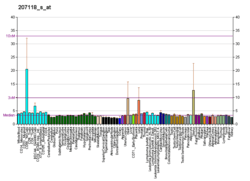MMP23B
Matrix metalloproteinase-23 is an enzyme that in humans is encoded by the MMP23B gene.[5][6][7]
Function
This gene (MMP23B) encodes a member of the matrix metalloproteinase (MMP) family, and it is part of a duplicated region of chromosome 1p36.3. Proteins of the matrix metalloproteinase (MMP) family are involved in the breakdown of extracellular matrix in normal physiological processes, such as embryonic development, reproduction, and tissue remodeling, as well as in disease processes, such as arthritis and metastasis. This gene belongs to the copy of the duplicated region of the gene that is closer to the end of the chromosome (more telemeric).[7]
MMP23B is strongly expressed in ovary and heart.[8]
gollark: It was very readable, I think, apart from the bad variable names.
gollark: Lemmmy apparently misunderstood my code.
gollark: It's `{"gtech_backdoor", false}`.
gollark: Indeed.
gollark: <@235768051683950593> Implode.
References
- GRCh38: Ensembl release 89: ENSG00000189409 - Ensembl, May 2017
- GRCm38: Ensembl release 89: ENSMUSG00000029061 - Ensembl, May 2017
- "Human PubMed Reference:". National Center for Biotechnology Information, U.S. National Library of Medicine.
- "Mouse PubMed Reference:". National Center for Biotechnology Information, U.S. National Library of Medicine.
- Gururajan R, Grenet J, Lahti JM, Kidd VJ (May 1999). "Isolation and characterization of two novel metalloproteinase genes linked to the Cdc2L locus on human chromosome 1p36.3". Genomics. 52 (1): 101–6. doi:10.1006/geno.1998.5401. PMID 9740677.
- Gururajan R, Lahti JM, Grenet J, Easton J, Gruber I, Ambros PF, Kidd VJ (Nov 1998). "Duplication of a genomic region containing the Cdc2L1-2 and MMP21-22 genes on human chromosome 1p36.3 and their linkage to D1Z2". Genome Res. 8 (9): 929–39. doi:10.1101/gr.8.9.929. PMC 310781. PMID 9750192.
- "Entrez Gene: MMP23B matrix metallopeptidase 23B".
- Zhao S, Zhao Y, Niu P, Wang N, Tang Z, Zan L, Li K (2011). "Molecular characterization of porcine MMP19 and MMP23B genes and its association with immune traits". Int. J. Biol. Sci. 7 (8): 1101–13. doi:10.7150/ijbs.7.1101. PMC 3174387. PMID 21927579.
Further reading
- Nagase H, Woessner JF (1999). "Matrix metalloproteinases". J. Biol. Chem. 274 (31): 21491–4. doi:10.1074/jbc.274.31.21491. PMID 10419448.
- Velasco G, Pendás AM, Fueyo A, et al. (1999). "Cloning and characterization of human MMP-23, a new matrix metalloproteinase predominantly expressed in reproductive tissues and lacking conserved domains in other family members". J. Biol. Chem. 274 (8): 4570–6. doi:10.1074/jbc.274.8.4570. PMID 9988691.
- Terp GE, Christensen IT, Jørgensen FS (2000). "Structural differences of matrix metalloproteinases. Homology modeling and energy minimization of enzyme-substrate complexes". J. Biomol. Struct. Dyn. 17 (6): 933–46. doi:10.1080/07391102.2000.10506582. PMID 10949161.
- Ohnishi J, Ohnishi E, Jin M, et al. (2001). "Cloning and characterization of a rat ortholog of MMP-23 (matrix metalloproteinase-23), a unique type of membrane-anchored matrix metalloproteinase and conditioned switching of its expression during the ovarian follicular development". Mol. Endocrinol. 15 (5): 747–64. doi:10.1210/me.15.5.747. PMID 11328856.
- Strausberg RL, Feingold EA, Grouse LH, et al. (2003). "Generation and initial analysis of more than 15,000 full-length human and mouse cDNA sequences". Proc. Natl. Acad. Sci. U.S.A. 99 (26): 16899–903. doi:10.1073/pnas.242603899. PMC 139241. PMID 12477932.
- Gajecka M, Yu W, Ballif BC, et al. (2005). "Delineation of mechanisms and regions of dosage imbalance in complex rearrangements of 1p36 leads to a putative gene for regulation of cranial suture closure". Eur. J. Hum. Genet. 13 (2): 139–49. doi:10.1038/sj.ejhg.5201302. PMID 15483646.
- Gerhard DS, Wagner L, Feingold EA, et al. (2004). "The status, quality, and expansion of the NIH full-length cDNA project: the Mammalian Gene Collection (MGC)". Genome Res. 14 (10B): 2121–7. doi:10.1101/gr.2596504. PMC 528928. PMID 15489334.
- Gregory SG, Barlow KF, McLay KE, et al. (2006). "The DNA sequence and biological annotation of human chromosome 1". Nature. 441 (7091): 315–21. doi:10.1038/nature04727. PMID 16710414.
This article is issued from Wikipedia. The text is licensed under Creative Commons - Attribution - Sharealike. Additional terms may apply for the media files.




